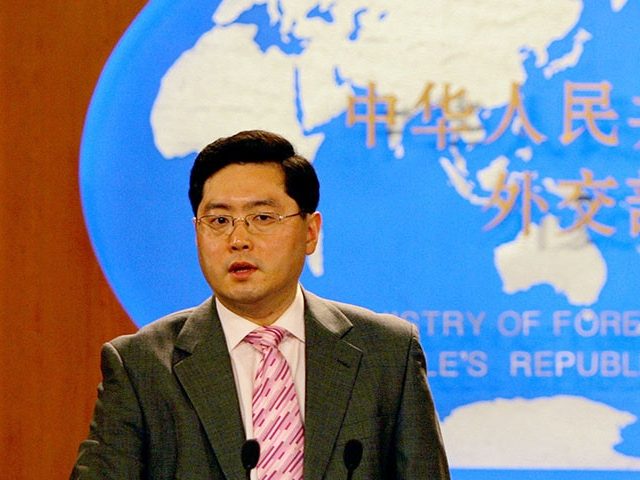Chinese Ambassador to the United States, Qin Gang, said in an interview published by regime media on Friday that Beijing would like to impose the repressive “One Country, Two Systems” policy currently in effect in Hong Kong on the nation of Taiwan. It emphasized the “two systems” aspect of the policy is “subordinate to” the one country.
China adopted “One Country, Two Systems” in Hong Kong after the British government surrendered its former colony to the Communist Party in 1997. China promised that it would allow Hong Kong to remain free and capitalist – the “two systems” – so long as Hong Kong accepted Chinese sovereignty over it (the “one country”). The premise of the policy is that Communist Party laws implemented in Beijing would simply not apply in Hong Kong and Hongkongers would not be subject to persecution by the Chinese judicial system.
“One Country, Two Systems” is extremely unpopular among Taiwanese people, polls have routinely shown – particularly after Beijing responded to a pro-democracy protest movement in Hong Kong in 2019 with disproportionate violence and the outlawing of anti-communist dissent, effectively ending “One Country, Two Systems” in theory. Taiwan is a sovereign nation with its own state apparatus governed through a democratic, capitalist system and has never been governed by any regime based in Beijing. The Chinese Communist Party nonetheless falsely insists that Taiwan is a province of China and repeatedly calls for “reunification.”
Qin said in the interview published in the People’s Daily on Friday that the Chinese government would rule Taiwan using the “One Country, Two Systems” policy, but that any activity that undermined China, presumably including democratic governance and capitalism, would violate the policy.
“For the arrangements after the reunification, we have proposed the philosophy of ‘One Country, Two Systems.’ This is the best design for Taiwan,” Qin told the reporters assembled, which the People’s Daily listed as including American journalists from corporate outlets such as Bloomberg, the Associated Press, and Politico. “‘One Country, Two Systems’ was first put forward to resolve the Taiwan question. We believe it has fully considered Taiwan’s realities, and it’s conducive to Taiwan’s long-term stability and prosperity.”
Qin called the policy the “most inclusive solution” to China’s problem of Taiwan existing, then clarified, discussing the fate of Hong Kong, that Beijing would not actually allow two systems to coexist under the “One Country, Two Systems” policy.
“When people talk about ‘One Country, Two System,’ please don’t forget the foundation and precondition is ‘one China,'” Qin said. “We cannot allow the foundation or precondition of ‘one China’ to be denied by the ‘two systems.'”
“If there’s no ‘one country,’ there will be no ‘two systems,'” he warned.

A man wearing a Captain America costume walks on a street as protesters and pedestrians gather near the Mong Kok police station in Hong Kong on October 7, 2019. (Mohd Rasfan/AFP via Getty)
Answering a separate question, Qin insisted that the “two systems” in the policy must be “subordinate to and derived from” allegiance to communist China.
The policy effectively ended in Hong Kong after the 2019 pro-democracy protest movement, which itself began in defiance of Beijing’s plan to violate “One Country, Two Systems” by imposing a law that would allow China to extradite anyone present in Hong Kong if accused of violating communist law. Millions of Hongkongers joined peaceful protests throughout that year in defense of “One Country, Two Systems,” prompting the Communist Party to deploy violent thugs to beat the protesters with sticks and to arrest the most prominent organizers of the protests.
In 2020, to ensure a definitive end to the protest movement, the National People’s Congress in Beijing – which, under “One Country, Two Systems,” should have no authority over Hong Kong – passed a “national security law” that outlawed anti-communist dissent. The law requires courts to sentence defendants to at least ten years in prison if found guilty of the crimes of “terrorism,” “secession,” “incitement to foreign interference,” and “incitement to subversion of state power.”
One of the first people arrested under the law was a soccer fan celebrating a victory by the Liverpool, England soccer team.
The Taiwanese government has enthusiastically rejected the implementation of “One Country, Two Systems” in their country, asserting that Taiwan is a sovereign state.
“It has long been a mainstream opinion in Taiwan that one country, two systems is unacceptable and is not an option for Taiwan,” Taiwan’s Mainland Affairs Council said last week responding to Beijing’s calls to implement the policy.
Public polls have for years, particularly after the state violence in Hong Kong, shown that Taiwanese people do not want to “reunify” with China. In March 2019, before the eruption of protests in Hong Kong, a poll found that 79 percent of Taiwanese opposed “One Country, Two Systems” in their country.
“In addition, nearly 90% of the public believe that Taiwan’s future and the development of cross-Strait relations should be decided by the 23 million people of Taiwan (87.7%),” the Mainland Affairs Council, which conducted that poll, observed at the time.
More recently, the Taipei Times reported on Friday that a Mainland Affairs Council published this week found that nearly 81 percent of Taiwanese consider China a “hostile” state to the Taiwanese government. A majority, 66.6 percent, said China was hostile to Taiwanese people generally. Large majorities condemned China’s threatening military activities around Taiwan, which began this month in response to American Speaker of the House Nancy Pelosi (D-CA) visiting Taipei, and supported Taiwanese President Tsai Ing-wen in calling for an end to the threats.
The poll found 76.2 percent of Taiwanese rejected the idea that Taiwan is part of China.
Follow Frances Martel on Facebook and Twitter.

COMMENTS
Please let us know if you're having issues with commenting.